This year is the 10th anniversary of the election of Pope Francis to the papacy, which occurred on March 13, 2023. In recognition of this anniversary, several news outlets were granted interviews with the Holy Father in the month of March. Francis addressed the questions in his signature style of frankness and informality. The topics covered ranged from Francis’ personal feelings about being Pope to the wartime political situation in Ukraine and Russia, to his more controversial pronouncements touching on Church doctrine and pastoral practice. We excerpt four of them here.
“The Church is not a home for some, it is a home for all”
By Paolo Rodari
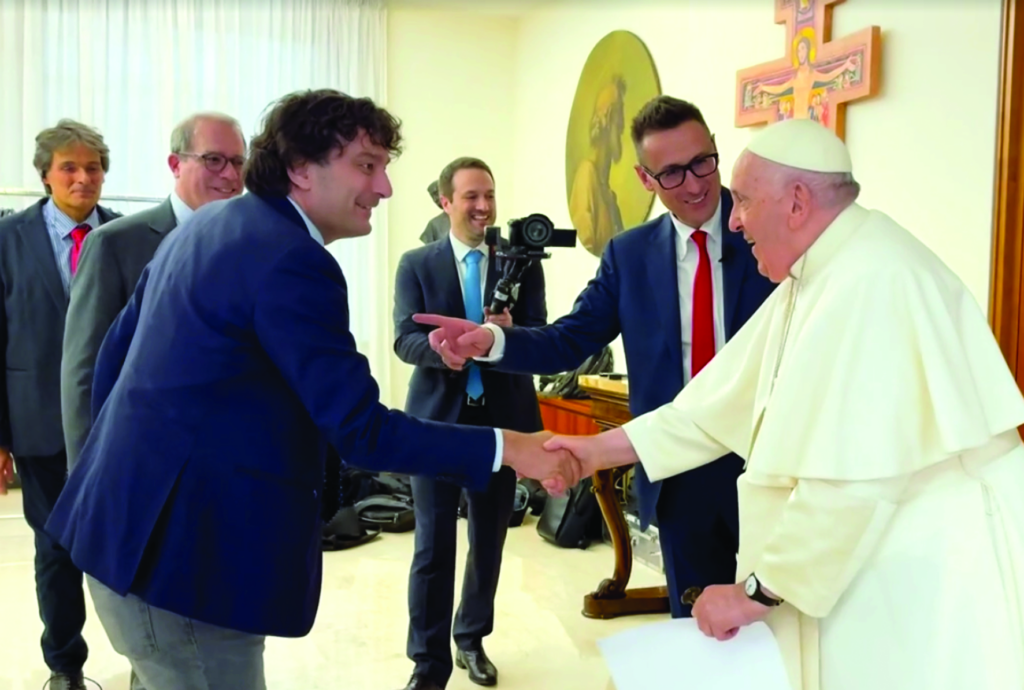
March 10, 2023. Paolo Rodari introduces to the Holy Father the staff of editors and technicians of Italian-Swiss Radio and Television who will assist him during the interview
Excerpts of an interview with Pope Francis conducted by Paolo Rodari on March 10, 2023 for Italian-Swiss Radio and Television, and broadcast on March 12, the eve of the tenth anniversary of the pontificate.
Paolo Rodari: Holy Father, in these 10 years, how much have you changed?
POPE FRANCIS: I am old. I have less physical endurance; the knee injury was a physical humiliation, although it is healing well now.
Jesus asks that everyone be brought to His table. What does this mean?
It means that no one is excluded. When the guests did not come to the feast, He said go into the main roads and invite to the banquet whomever you find, the sick, the good and the bad, the small and the great, the rich and the poor, everyone. We must not forget this: the Church is not a home for some, it is not selective. The holy faithful people of God are: everyone.
There are several wars in the world. Why is it difficult to understand the horror they cause?
In a little over a hundred years there have been three world wars: 1914-18, 1939-45, and this one which is a world war. It started in bits and pieces and now no one can say it is not worldwide. The great powers are all caught up in it. The battlefield is Ukraine. Everyone is fighting there. This brings to mind the arms industry. An expert told me: if for one year no weapons were produced, the problem of world hunger would be solved. It is a market. Wars are made, old weapons are sold, new ones are tested.
Before the conflict in Ukraine, you met Putin several times. If you met him today, what would you say to him?
I would speak to him as clearly as I speak in public. He is an educated man. On the second day of the war I went to the Russian embassy at the Holy See to say that I was willing to go to Moscow if Putin would give me a window to negotiate. Lavrov wrote to me saying thank you but now is not the time. Putin knows I am available. But there are imperial interests there, not only of the Russian empire, but of empires elsewhere. It is typical of the empire to put nations in second place.
How were Benedict XVI’s 10 years at Mater Ecclesiae?
Good. He is a man of God; I love him very much. The last time I saw him was at Christmas. He could hardly speak. He spoke in a very low voice. His words had to be “translated.” He was lucid. He was asking questions: how is this going? And what about that problem? He was up to date on everything. It was a pleasure to talk to him. I would ask for his opinion. He would tell me what he thought: he was always balanced, positive, a wise man. The last time, however, you could see he was nearing the end.
“Gender Ideology Is Sinister”
By Jorge Fontevecchia
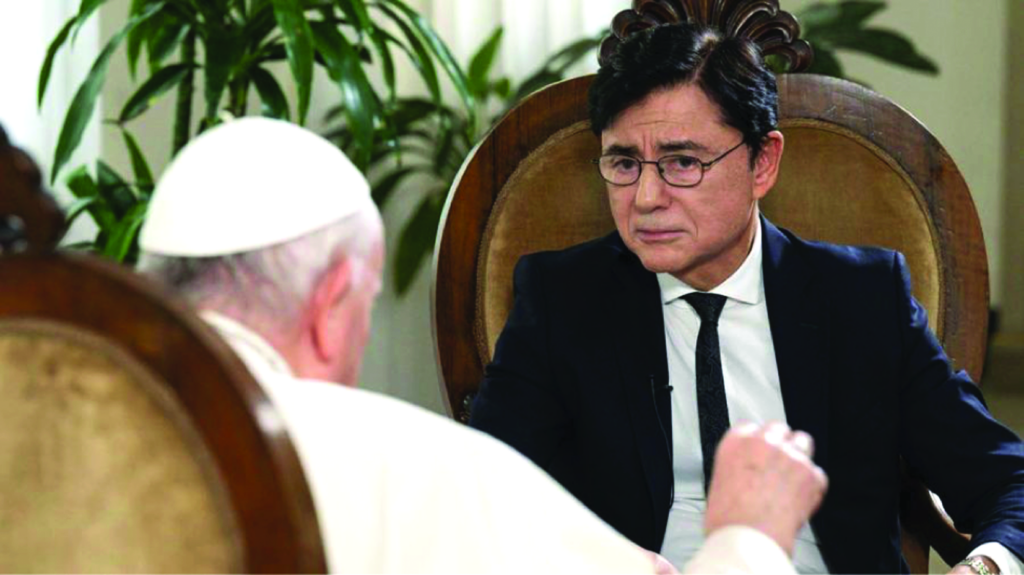
March 17, 2023. Pope Francis during the interview, at Casa Santa Marta, with Argentine Jorge Fontevecchia, CEO of Perfil Network
To mark a decade of his papacy, Francis received Jorge Fontevecchia, CEO of Perfil Network, at the Vatican for an interview of both great length and great depth, published March 17.
Jorge Fontevecchia: Science states that the Big Bang marks the beginning of the universe, while the Bible states that it was God who created the universe. What is your own interpretation of the beginning?
POPE FRANCIS: The main thing here is that there was a beginning, that is key: there was something that started. The Book of Genesis was not the first to be written in the Bible. The first was Exodus, that is, the experience of the liberation of Israel. Then he looked back and wondered how things started…
When God created, he did not create everything perfect, he created it in a process and it is the same as the Bible tells us. There was a process, that is why those seven days are symbolic of a whole process of centuries, but it is a reinterpretation through the history of Israel, of the exodus. And it is a rereading of what human salvation would be from chaos to the cosmos.
What is your interpretation of hell and paradise?
Hell is not a place… hell is a state, it is a state of the heart, of the soul, of a position towards life, towards values, towards family, towards everything… he is already in it from here. If you ask me how many people there are in hell, I answer you with a famous sculpture from Deslé cathedral — I don’t know if it’s from the 11th century or the 9th century, in southern France — there is a famous capital, the columns have capitals… And that capital has Judas hanged and the devil pulling down, and on the other side they have the Good Shepherd, Jesus, who grabs Judas and takes him away with an ironic smile. What does that mean? That salvation is stronger than damnation.
“Hell is not a place… hell is a state, it is a state of the heart, of the soul, of a position towards life, towards values, towards family, towards everything…”
Those who consider that since the Church is not a worldly institution, it should not be updated to modern times… Does time stop?
Pope Francis: It does for the “indietrists” (those always looking back). When somebody tells me: “This is traditionalist,” it could be on the right lines because tradition always moves ahead. Tradition is like the root of the tree and then afterwards the sap of the tree makes it grow ever upwards. Tradition is healthy because it has this dynamism. The problem is taking a step back because it was always done that way before and there are people who take a step back. There is a phrase in [Saint Paul’s] Letter to the Hebrews which has always caught my attention, which partly refers to this when it says: “We are not people going back but forward.” The problem is not tradition, which is always a source of inspiration; the problem is what I call “backwardism,” being stuck in the past century 20 or more years ago.
You were ordained a priest in 1969 after the conclusion of the Second Vatican Council. Are you purely the product of that Vatican II?
In part yes, in part no. I studied theology and, of course, philosophy according to the old school. When I was studying theology, the Council had recently started and some professors were introducing some innovations, but it was the old school. It was only very advanced in the Holy Scriptures because that leads to another kind of thinking and research and I had some excellent professors like [Severino] Croatto, for example. Only there would I say that I had a very up-to-date training in Holy Scriptures and I had to catch up with the rest later. In Morality, for example, I had the most traditional and narrow-minded training there was in those times and I had to reassemble Morality afterwards on my own account.
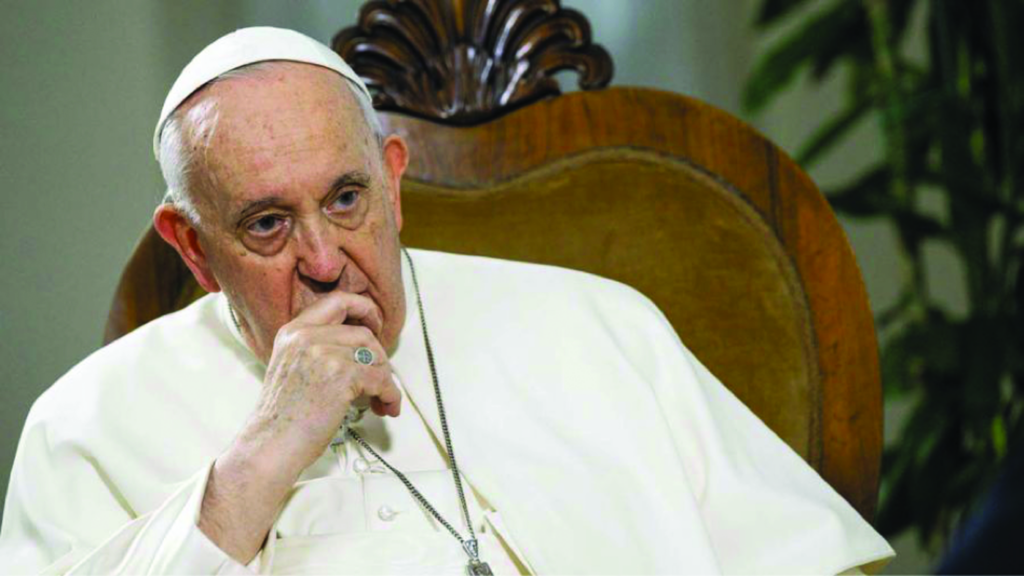
“When we were kids, the custom among the most Catholic families was not to go to the houses of divorced people because that gave the impression of having already taken one step into Hell…”
How did you arrive at the conclusion that the Church must display greater understanding towards the divorced?
Jesus beat me to it. My attention was caught by that parable so characteristic of Him when those fussy people were dodging the invitation to the banquet and Jesus, transforming His mood into the wrath of God, saying: “Go to the crossroads and bring them all to me, the healthy and the sick, the righteous and the sinners, big and small, old and young, everybody.” The call of Jesus is for everybody — the Church is universal in that aspect. And nobody can say: “They’re sinners and I’m not.”
When we were kids, the custom among the most Catholic families was not to go to the houses of divorced people because that gave the impression of having already taken one step into Hell. That is not a Christian concept, it’s really political, segregationist, etc. Jesus tells us today: ‘everybody,’ and each person in the Church, aided by the community or by the pastor or whoever, should review and analyze their situation, placing themselves before God. Nowadays it is the right of Christians and a duty of the Church to accompany the new unions. Nobody can say: “You’re divorced so you’re on the list for Hell.” No, they are children of God who have taken their path, I cannot judge them from outside. That’s very clear, that’s why everybody must be accompanied.
And secondly, Benedict XVI, when he was prefect of the Congregation for the Doctrine of the Faith [in Alto Adige, Piedmont and Rome] said that many marriages were invalid for the Church. Why? Because when people said: “Yes, until death do us part,” they never took responsibility for what that meant. So a separated and remarried person is perhaps the victim of a superficial culture and way of thinking, even within the Church. Nowadays we are insisting on religious instruction to prepare for matrimony and afterwards. When they say “until death do us part,” they sometimes have no idea what “forever” means and separate within a year. […]
How about civil unions between people of the same sex?
When same-sex marriage was discussed in Argentina, the Synod argued vigorously and I, along with many other bishops, proposed that there should be the option of a civil union, not only for persons of the same sex but also to help others. We were thinking that three old-age pensioners could make a civil union of their assets for their mutual benefit with the inheritance going to one or two of them. Civil union is a much broader thing, it’s a social contract which somehow guarantees social rights and a certain stability without being the sacrament of matrimony or at least some kind of marriage. In my eyes this means the internal voting in the Synod went badly and that’s why the law [for samesex marriage] was passed because we gave the government no alternative. I believe that civil union should exist.
In a recent interview with the Associated Press, you maintained that homosexuality was not a crime but it was a sin. What happens with respect to the possibility of going to Hell or Paradise?
I return to what I said about going to Hell. I’ve spoken three times about homosexuality, the first time during my flight to Rio de Janeiro, when I said: “If a person is homosexual and seeks God, who am I to judge them?” As if to say, “Enough is enough,” let’s not victimize them. The second time, on my trip to Ireland, I told a father and mother: “Never throw a homosexual child out of your home, accept them and work them into your family.” And the third time at a press conference and the Associated Press interview where I spoke of criminalization. Unfortunately homosexuality is criminalized today in more or less 30 countries, with capital punishment in almost 10 of them. That is very serious and I also said so very clearly. My stance on homosexuality is contained in those three occasions. Here [in Rome] at the general audience, persons belonging to homosexual groupings are among the other people, presenting themselves as such, and I greet everybody. They are all children of God with each one seeking God and finding Him any way they can. God only leaves aside the arrogant, all other sinners are in line.
What is your position on voluntary celibacy?
That is a possibility which exists within the Catholic Church. All the Greco-Catholics have it. Here in the Secretary of State’s department we have a father who lives with his wife and small daughter. It’s an open possibility. I don’t know if it will open up or not, but it remains a possibility. There have indeed been local concessions over this issue throughout the history of the Church, not just in Eastern Europe where it is already normal, but in part here.
To what do you owe the preponderance of cases of sexual abuse of children within the Catholic Church?
There I want to be very objective. According to the percentages of the worldwide statistics of the United Nations, UNICEF, etc.; between 40 and 42 percent of the abuses occur at home and in the neighborhood where they persist in the old habits of covering up for the uncles, grandfathers and neighbors. Then come the clubs, then the schools and finally Catholic priests who account for three percent. That might not seem like much but it is because Catholic priests are proportionally fewer compared to everybody else, so that three percent weighs far more heavily than the 40 percent of others. And secondly it is blasphemy. If you have a vocation to be a priest or nun, instead of helping that person to seek God, you eat them alive.
That’s an aggravating factor.
That is the work of the Commission and all that, but there is one loose point of child abuse which I’d like to underline and that is the problem of kiddie porn produced live, sometimes with very small children. I wonder what country produces that, nobody knows. What hidden pacts are there between certain authorities of this or that place and the producers of kiddie porn? That’s why I always ask the authorities to open their eyes and look around because unfortunately kiddie porn is within the reach of anybody’s mobile telephone. The damage it does is like a drug — once you develop the taste, [so hard to] get out… Who produces and where and who is covering up that production are all questions which must be answered.
The Anglican Church is analyzing a change in the Lord’s Prayer (“Our Father”) to remove gender connotations, saying that God is neither man nor woman. What do you think?
We were talking a bit about that in the airplane with the Archbishop of Canterbury when returning from South Sudan, and it’s a very small group within the Church of England, within a line of taking gender out of everything — “I want to be father and mother, both together.” Here a very great danger of our times comes into play, which is gender ideology. Of all the ideological colonizations today, it is the worst, in my judgment, because it erodes differences — leading one to think there are none, when it is the rich contrast of the differences which makes for progress. Gender ideology is sinister…not the persons in any way caught up in it, but the ideology itself which simplifies, unifies and removes differences.
About that I once read a novel written in 1903, The Lord of the World by [Robert Hugh] Benson, with a glimpse of the future which describes what is happening now. The novel is a bit heavy but worth reading because it makes you see with that futuristic outlook this trap of removing differences and making everything uniform, governed by one single person, all uniform. And such uniformity is the most inhuman thing there is, because if there is one thing which distinguishes us human beings, both men and women, it is creativity and liberty. I cannot imagine a dog painting a picture, while I can imagine Picasso doing so because there is a creativity born of liberty which an animal does not have.
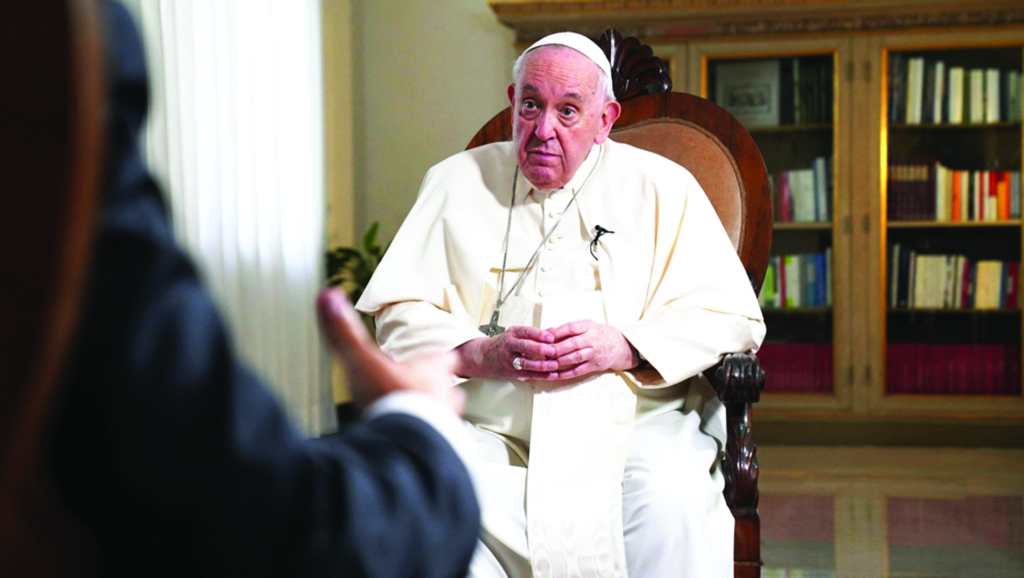
“Of all the ideological colonizations today, gender ideology is the worst, in my judgment, because it erodes differences…”
Monsignor Oscar Ojea has related that the first meeting of all the bishops with you after your election as Pope was via videoconference when you asked the Argentine bishops to pray for you so “this does not go to my head.” You have singled out arrogance as the cardinal sin. How do you prevent this?
It has to be by the grace of God, you have to ask for it. Arrogance does not come suddenly, it starts with vanity, which is the silliest thing, looking at yourself in the mirror. The day you smash the mirror is the day the circumstances of your life change. Arrogance is born out of vanity. And sometimes it takes much humility to ask God to look after us and also listen to other people, accepting criticisms.
Does any version of capitalism which could be aligned with the social vision of the Church exist?
The answer to your question was best defined by Saint John Paul II by adding the word “social” to the market economy: he was in agreement [that it could]. Today things have gone beyond that and we can have a very good economic dialogue and achieve steps towards understanding or formulas which work well. Conversely, there is no good dialogue with the financial world. Finance is gaseous, the economy concrete.
English-language translation: Michael Soltys and Martin Soltys.
“When I am in tune with Him, I feel at peace”
By Guillermo Marcó
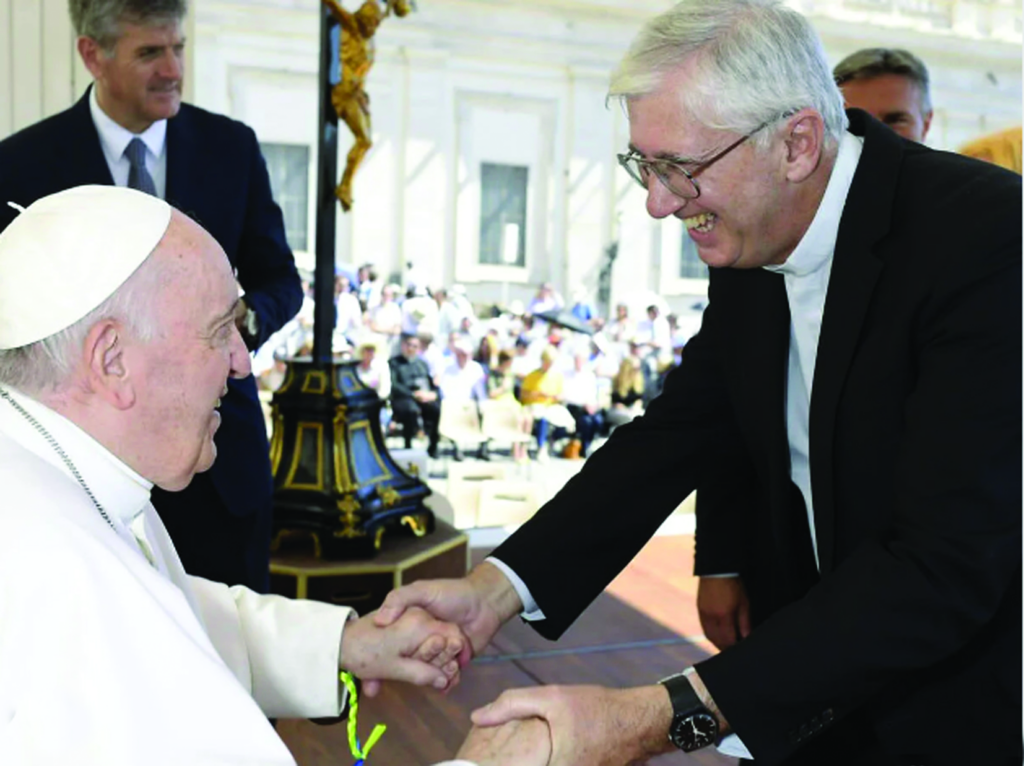
Pope Francis meets Argentine priest Fr. Guillermo Marcó, former spokesman for Jorge Mario Bergoglio when he was archbishop of Buenos Aires
Argentine priest Fr. Guillermo Marcó, former spokesman for Jorge Mario Bergoglio when he was archbishop of Buenos Aires, conducted an interview with his friend, the Pope, at Casa Santa Marta, published by L’Osservatore Romano on March 14, 2023.
Guillermo Marcó: The first thing I want to ask you is what attracts you most in following Jesus.
POPE FRANCIS: I can’t express it verbally. What I can say is that when I am in tune with Him I feel at peace, I feel happy. When I don’t follow Him, because I’m tired, because I set Him a specific time or a time limit, I feel insipid. It is as if I were already filled with my life… Someone once said to me: “God gives you freedom, he always gives you freedom, but once you know Jesus you lose your freedom.” This put me in crisis. I don’t know if one actually loses it or not, but the way in which the Lord calls you and establishes a dialogue with you makes you say: “No, I’m not going anywhere else, this is enough for me.”
There, in that confessional of the parish of San José de Flores, you were able to discern your vocation: what did you feel was particularly special in that call?
It’s curious because after that experience on September 21st I went on with my life without knowing what I was going to do. But there was something different that was slowly establishing itself. I didn’t leave there to go to the seminary… It was three years. It’s like a process that changes your orientations, your references. The Lord enters your life and rearranges it. And without taking away your freedom. I’ve never had the feeling that I’m not free.
“When I am in tune with Him (Jesus), I feel at peace, I feel happy”
You have your devotions. Here is this painting of Our Lady Undoer of Knots, a devotion begun in Germany. Can you tell us why you always sent it with your notes in your envelopes?
I’ve never gone to where the original image is. It happened that a German nun sent it to me as a greeting. I liked it. I began to have a devotion to this image in Argentina. The story is beautiful, but the picture is not worth much; it is from the low baroque of the 1700s, already decadent – a painter of the time who put his wife through hell. They were very Catholic but fought every day. And one day he read the text of Saint Irenaeus of Lyons, according to which the knots that our mother Eve had tied with her sin had been untied by our mother Mary with her obedience. The Council took it and inserted it, I believe, in the Constitution on the Church.
He liked it and so he asked Our Lady to untie the knot he had with his wife because they didn’t get along.
And this is why below he paints the archangel Raphael with Tobias who leads him to look for his fiancée (now his wife), to meet her. The Virgin performed the miracle and it all started from there.[…] It is as if Our Lady is able to help you, as the text of Saint Irenaeus says, to help you unblock things.
“I would be suspicious if there were no resistance”
By Daniel Haddad
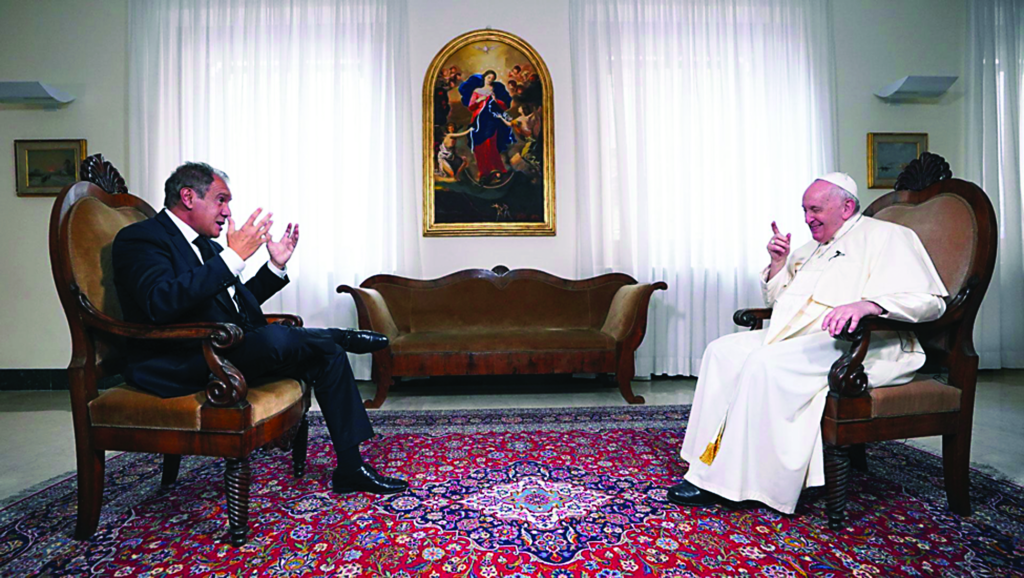
Pope Francis during the interview in Santa Marta with Daniel Hadad, owner of the Argentine portal Infobae
Pope Francis received Daniel Hadad, founder of Infobae, at the Vatican where they discussed different topics, from the war in Ukraine and Latin America to his daily prayer life, in an interview published March 10, 2023.
Daniel Haddad: Holy Father, did you feel at first, or I don’t know if now, resistance on the part of the Church or the bishops of Rome before some ideas or some changes that you promote?
POPE FRANCIS: Resistance is like an attitude of self-defense, always, in the face of any novelty, in the face of anything. I would be suspicious of decisions in which there were no resistance…I would be suspicious of a Congress, for example, where they don’t fight among themselves. That there were no different opinions. That they resist things from the Executive and vote against it. A passive Congress is not a Congress, it is a primary school, or even less so.
Many more women working in the Vatican…
Yeah. And that is necessary. Machismo is bad. And sometimes celibacy can lead you to machismo. A priest who does not know how to work with women is missing something, he is not mature. The Vatican was all very macho, but it’s part of the culture, it’s no one’s fault. It was always done that way. Now they are working more.
An example: the Economy Council is made up of six cardinals and six lay people. It was necessary to renew and I put in a man and five women. I once received a very high-level head of government, a mother and a professional, a professional who later went into politics and is doing well. And I asked her how she had managed to resolve a very difficult conflict that had occurred in that place; nobody could solve it and she managed to solve it… She looked at me: silence. “As we mothers do.” I don’t know exactly what she meant, but “as we mothers do” solved the problem. They have another methodology, women. They have a sense of time, of waiting, of patience, different from man.
How many hours do you sleep per day?
Six. From 10 to 4. After lunch, half an hour.
Nap?
Yes, half an hour.
A curiosity: in the book El pastor you comment that since 1990 you haven’t watched television. Can I know why?
Yes. July 15, 1990. I was with the community watching television and some things appeared that are not good for the heart. Not a sinful thing, but those relativisms that weaken the heart. I got up, because I didn’t like it, and I left, very restless. I don’t know why I left if it wasn’t such a big deal. And the next day — that was on the night of July 15 — at the mass for the Virgin of Carmel, I felt that I didn’t have to see television, period. And I said, enough, and I made the promise.
Is it true that you don’t use a cell phone?
I never had one.
Never?
When they made me a bishop they gave me one, in [year] ’94, or ’92. At that time it was [the size of] a shoe. I said “I’m never going to use this.” “Okay, but make a call.” There, in front of the person who gave it to me, I called my sister: “How are you doing?” Boom! I cut off. I gave it back. And never again.
Holy Father, do you pray at any particular time? In your room, in the chapel? Where do you pray?
In the morning I celebrate Mass right away, if I don’t have Mass outside the chapel. At six in the morning I have Mass. Before, I say a little prayer, and after too. I get up at four, at five I’m already praying there in my room; 5:50 I go to the chapel and there I celebrate Mass, generally alone or with a priest who comes, accompanies me, and that helps me; when there is another it helps me more. And then the day begins.

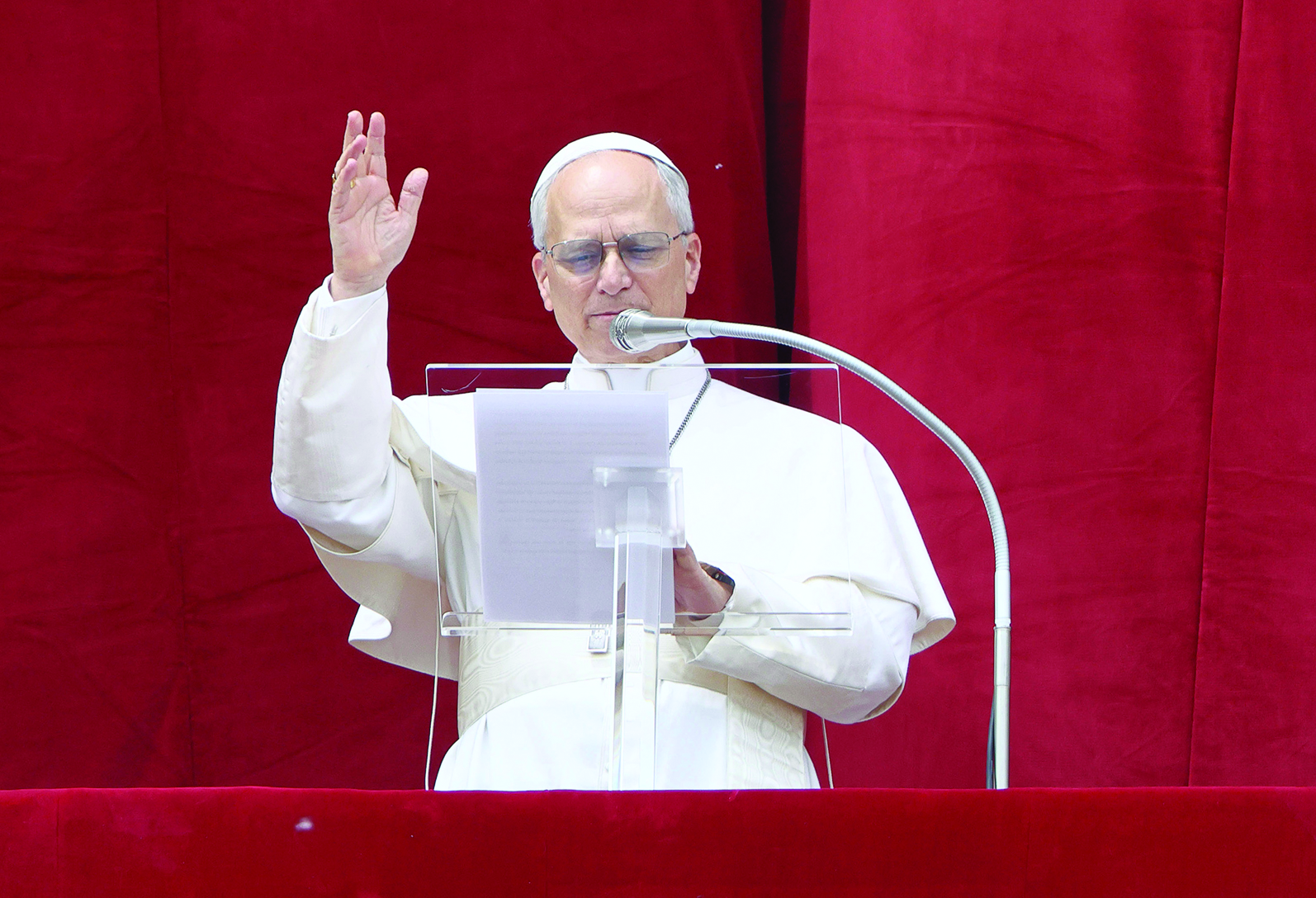
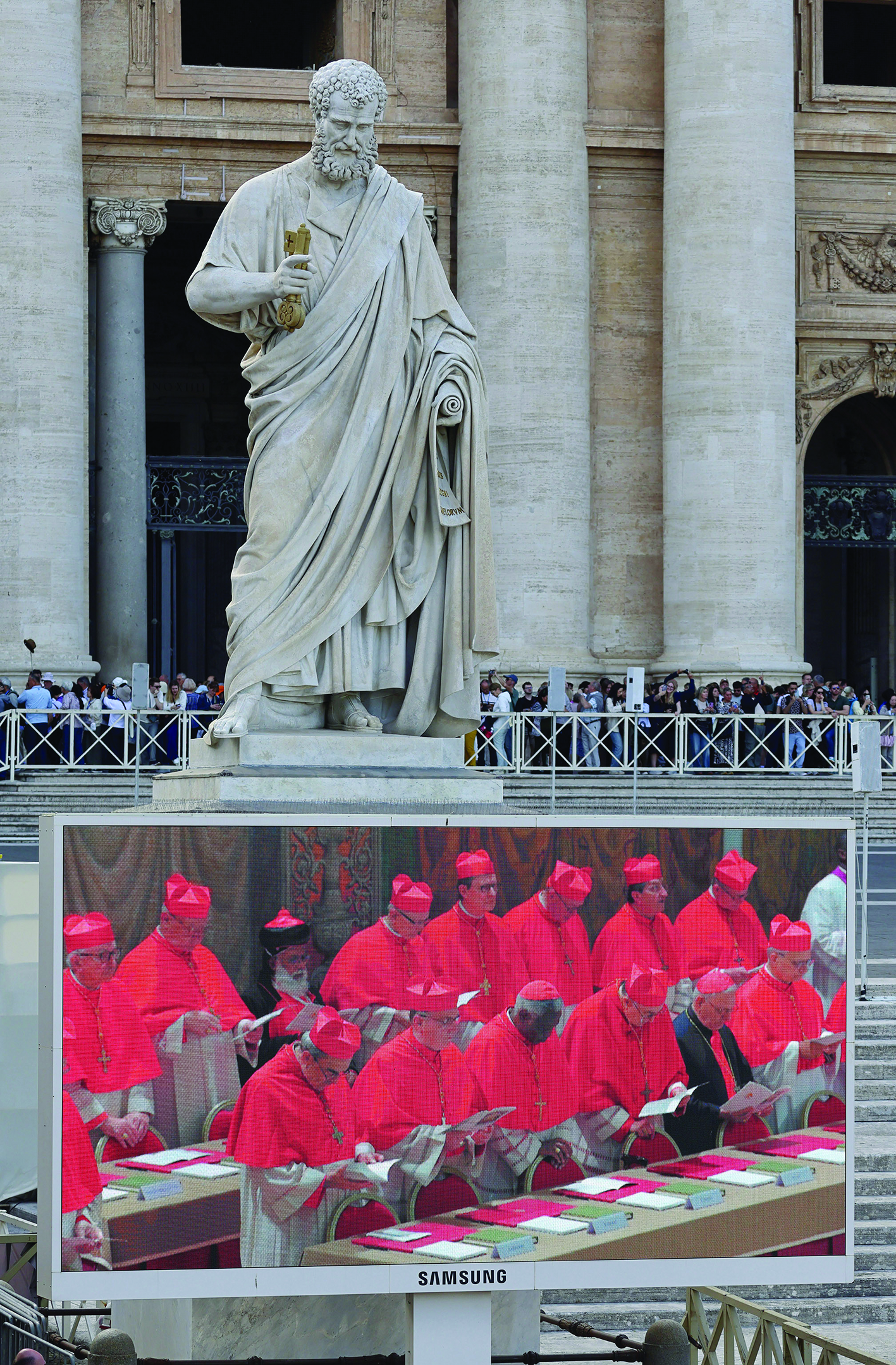
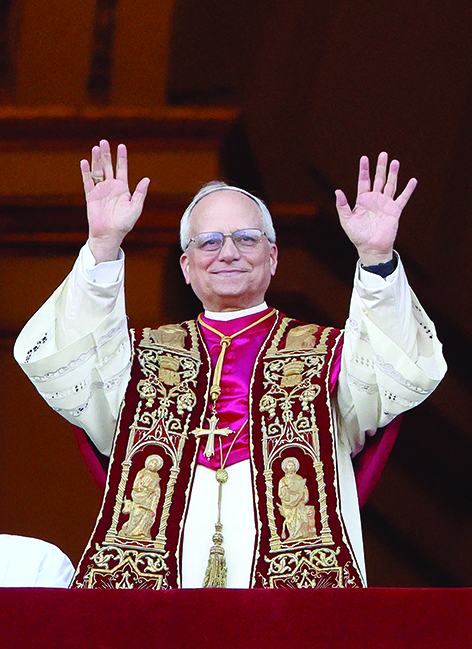
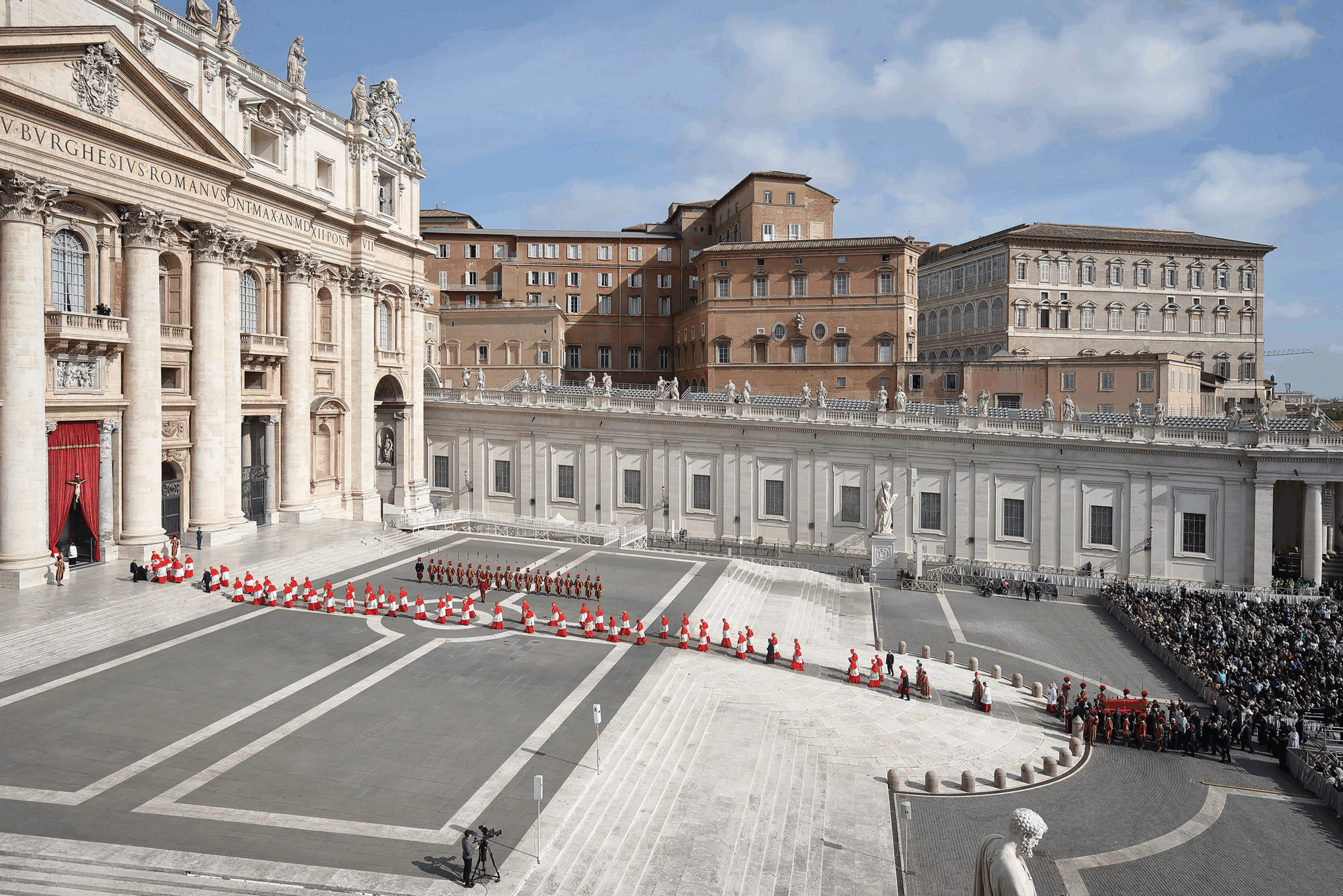
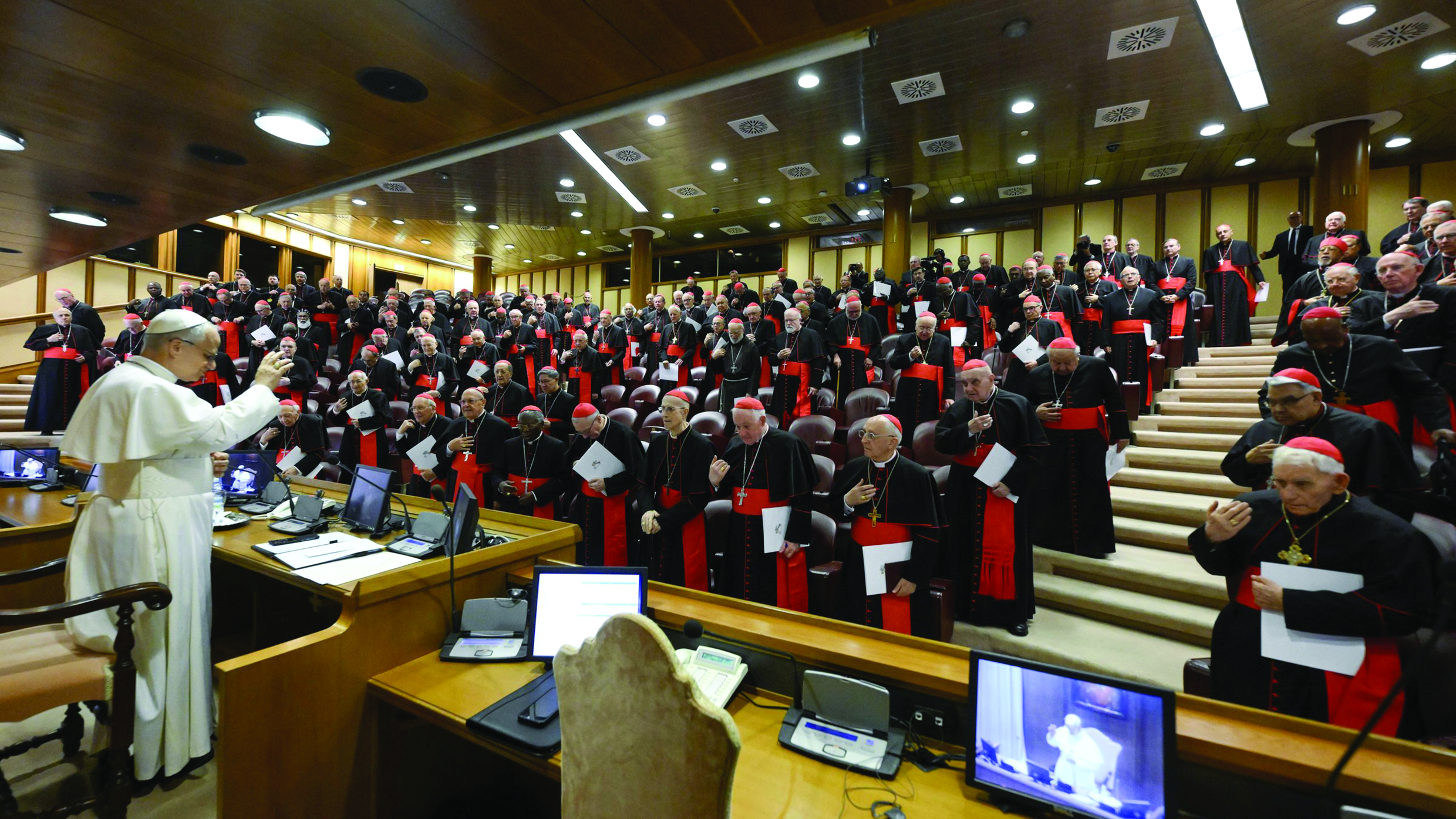
Facebook Comments